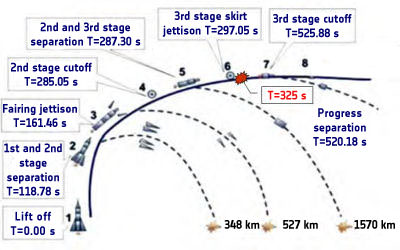[/caption]
The Russian space agency has provided an update on the investigation into the August 24 failure of a Soyuz rocket engine carrying a Progress resupply ship to the International Space Station. On August 30 — less than a week after the mishap – investigators for Roscosmos said the crash was caused by a malfunction in the rocket’s third stage engine gas generator. They now say the malfunction was the result of a manufacturing flaw, which was “accidental.”
This update is encouraging news, and means a decreased likelihood of having to leave the ISS unmanned.
From the commission’s report (translated):
On the basis of analyzing the behavior of the parameters characterizing the operation of the propulsion system the third stage, and results telemetry data it is concluded that reducing consumption of fuel in the gas generator due to contamination tract of its submission. This led to a breach of working conditions and reduce the engine parameters, it shut down on command “Emergency engine shutdown.”
Commission members concluded that this new manufacturing defect is random. However, the decision on his skills as a unit, should be taken only after cross-checking and follow-up of a special program just grazed manufactured propulsion.
A thorough check of all similar rocket engines will begin. The emergency commission to investigate the issue, led by Anatoly Koroteev, head of the Russian Keldysh science research institute on rockets, also recommended tightening quality controls at the rocket-manufacturing plant, and recommended adding surveillance cameras in the plant.
The space agency said future Soyuz launches will occur depending on the engines’ condition, but didn’t offer a specific schedule.
At Kennedy Space Center for the launch f the GRAIL mission, NASA Administrator Charlie Bolden said he is confident the fixes and checks will be done in time so that the ISS will not have to go unmanned. “We’re getting to the point where we’re going to satisfy ourselves that we can launch an unmanned vehicle to demonstrate that Soyuz is still okay, and then we’ll fly the crew up on a normal Soyuz mission later this fall,” Bolden, a former shuttle pilot and mission commander, said in an article in Florida Today.
“So the possibility of de-manning station is always something you think about, but it’s not something that is high on my list of concerns right now, because we don’t feel that is something that we’re going to have to do.”
At a press briefing last week, NASA ISS Program Manager Mike Suffredini said that two Soyuz-family unmanned rockets are scheduled to launch soon, which may provide a chance to test any fixes on unmanned launches before attempting a manned launch. A commercial Soyuz to launch a mobile communications satellites is scheduled on Oct. 8, and the Russians may launch the Progress resupply ship that is currently scheduled for October 26 a few weeks earlier in order to have another unmanned launch to study the problem.
The Progress cargo ships launch on a Soyuz-U rocket, while the Soyuz crew capsules, the Soyuz TMA launches on a Soyuz-FG. The third stages of the two rockets are virtually identical. The Soyuz-U rocket has had 745 successful launches and just 21 failures over nearly four decades. The Soyuz-FG has had 25 launches, all successful.
With NASA’s space shuttles retired as of July, Soyuz is the only means of getting astronauts to and from the space station.
Cargo can be brought by European and Japanese spacecraft, and SpaceX is scheduled for a demonstration cargo run late this year. Both NASA and Roscosmos confirmed that the astronauts are well-stocked with supplies on the space station, but the lifetime of the Soyuz currently at the ISS as return vehicles are limited to 200 days of on-orbit time. Of the six astronauts and cosmonauts aboard the station, the first set of crew of three will return to Earth next week via Soyuz, but it’s not known yet when their replacements will be able to fly. They original schedule has them launching on Sept 21, but that is unlikely. The second set of three ISS crewmembers will stay on board until mid-November.
Sources: Roscocmos, Florida Today


Phew!
Of course (recurrent) quality problems is nothing to play lit matches around, even less launches, but it would be eminently fixable.
As long as US pay over-prizes on the launches, there would be incentive too. Now to direct that incentive through the production chain…
Phew!
Of course (recurrent) quality problems is nothing to play lit matches around, even less launches, but it would be eminently fixable.
As long as US pay over-prizes on the launches, there would be incentive too. Now to direct that incentive through the production chain…